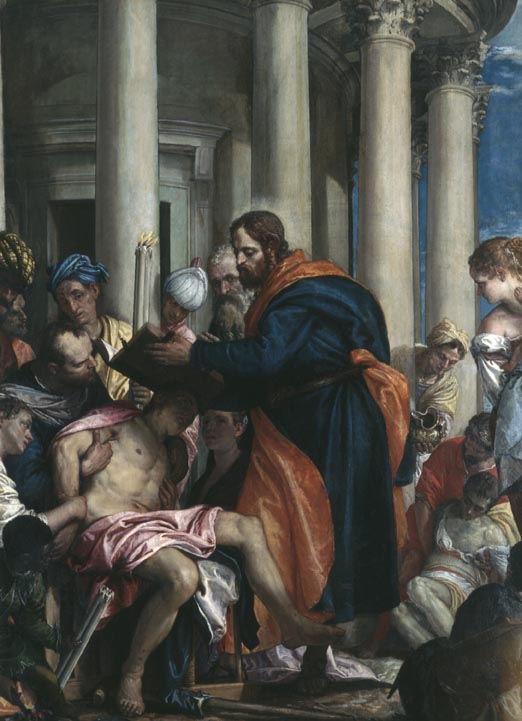
Barnabas curing the sick by Paolo Veronese, Musée des Beaux-Arts de Rouen.
Thursday June 11, 2015, is the Feast Day for Saint Barnabas.
For a more-complete rundown, see last year’s post, On St. Barnabas.
But first, there’s a reader comment to address. It had to do with The DORs for June 6, 2015. As edited for content, the comment was: “A really good post … BUT … Why 2 separate & unrelated subjects?? Giving joyfully & D-day … but good content.”
Here’s the answer: The trick I tried to pull off was blending two disparate subjects. Such dichotomies are common in both Western thought and Western literature especially. See How can we define and explain “dichotomy” in literature: “dichotomy is a useful literary device which creates drama, causes conflict and adds depth to characters and situations.” See also Dichotomy – Wikipedia, the free encyclopedia:
Perceived Dichotomies are common in Western thought. C. P. Snow believes that Western society has become an argument culture (The Two Cultures). In The Argument Culture (1998), Deborah Tannen suggests that the dialogue of Western culture is characterized by a warlike atmosphere in which the winning side has truth (like a trophy). Such a dialogue virtually ignores the middle alternatives. (Emphasis added.)
In the case of June 6, 2015, the theme was supposed to be: “We kicked Nazi butt in World War II because of American ingenuity. Because we’re inherently creative and because we constantly ‘ask questions.'” This was as opposed to certain Bible-thumpers of today who – in the realm of Bible reading – are “trying to create a culture that rewards conformism and stifles creativity.” That was the dichotomy: Applying a principle from World War II to Bible Study.
Again, the point was supposed to be that the question-asking, probing method of Bible study is far better for both the individual reader and for American society as a whole. It’s far better than just saying, “Oh, I’ll take everything that slick-haired televangelist says at face value!”
Of course I confess – I do not deny, but confess – that I may have been a bit too subtle.
So anyway, back to Barnabus. According to AmericanCatholic.org, Barnabus came “as close as anyone outside the Twelve to being a full-fledged apostle. He was closely associated with St. Paul (he introduced Paul to Peter and the other apostles) and served as a kind of mediator between the former persecutor and the still suspicious Jewish Christians.”
See also Barnabas – Wikipedia, and ST. BARNABAS, APOSTLE : Catholic News Agency:
The apostle and missionary was among Christ’s earliest followers and was responsible for welcoming St. Paul into the Church. Though not one of the 12 apostles . . . he is traditionally regarded as one of the 72 disciples of Christ and [the] most respected man in the first century Church after the Apostles themselves.
Note that the Bible first mentions Barnabas in Acts 4:36: “Joseph, a Levite, born in Cyprus, whom the apostles called Barnabas (son of encouragement), sold a field he owned, brought the money, and turned it over to the apostles.” And Barnabas the Apostle – Justus added that even after Paul’s Damascus Road experience, most Christians in Jerusalem “wanted nothing to do with him. They had known him as a persecutor and an enemy of the Church. But Barnabas was willing to give him a second chance.” (Which is pretty much what Jesus is all about.)
To sum up, if it hadn’t been for Barnabas and his willingness to give Paul a second chance – a second chance for the formerly zealous persecutor of the early Church – he might never have become Christianity’s most important early convert, if not the “Founder of Christianity.”
See also On St. Barnabas, from last year. That post noted that not only did Barnabus give Paul a second chance, he did the same thing with Mark. Mark in turn “responded well to the trust given him by the ‘son of encouragement,’ since we find that Paul later speaks of him as a valuable assistant (2 Tim 4:11; see also Col 4:10 and Phil 24).”
“So we might just call Barnabas ‘the Apostle of Second Chances.’”

If it wasn’t for Barnabus, Paul’s Damascus Road experience might have gone for naught…
The upper image was borrowed from last year’s post, On St. Barnabas. In turn it’s courtesy of Barnabas – Wikipedia, the free encyclopedia.
The lower image is courtesy of Conversion of Paul the Apostle – Wikipedia. The caption: “The Conversion of Saint Paul, a 1600 painting by the Italian artist Caravaggio.” See also What happened on the road to Damascus? That site noted: “The events that happened on the road to Damascus relate not only to the apostle Paul, whose dramatic conversion occurred there, but they also provide a clear picture of the conversion of all people.” (E.A.)
Re: Televangelists. See also Why are there so many televangelist scandals? – GotQuestions, Televangelists – Huffington Post (a list of articles on the subject), and Televangelist – RationalWiki.
Re: “argument culture.” The full title of Deborah Tannen‘s book is The Argument Culture: Stopping America’s War of Words. Tannen wrote an earlier book, You Just Don’t Understand: Women and Men in Conversation (1990). According to Amazon, in that earlier book “Tannen showed why talking to someone of the opposite sex can be like talking to someone from another world.”